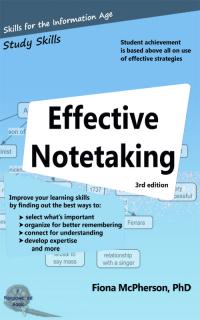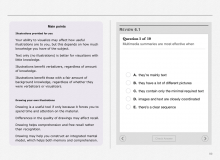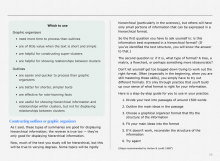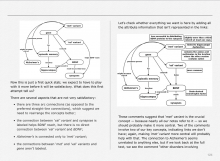Now in its 3rd edition!
You can predict how well a student will do simply on the basis of their use of effective study strategies.
This book is for college students who are serious about being successful in study, and teachers who want to know how best to help their students learn.
Being a successful student is far more about being a smart user of effective strategies than about being 'smart'. Research has shown it is possible to predict how well a student will do simply on the basis of their use of study strategies.
This workbook looks at the most important group of study strategies – how to take notes (with advice on how to read a textbook and how to prepare for a lecture). You’ll be shown how to:
- format your notes
- use headings and highlighting
- how to write different types of text summaries and pictorial ones, including concept maps and mind maps (you'll find out the difference, and the pros and cons of each)
- ask the right questions
- make the right connections
- review your notes
- evaluate text to work out which strategy is appropriate.
There's advice on individual differences and learning styles, and on how to choose the strategies that are right for both you and the situation.
Using effective notetaking strategies will help you remember what you read. It will help you understand more, and set you on the road to becoming an expert (or at least getting good grades!).
Successful studying isn’t about hours put in, it’s about spending your time wisely. You want to study smarter not harder.
As always with the Mempowered books, this thorough (and fully referenced) workbook doesn't re-hash the same tired advice that's been peddled for so long. Rather, Effective Notetaking builds on the latest cognitive and educational research to help you study for success.
This new edition includes advance organizers and multi-choice review questions for each chapter, plus some more material on multimedia learning, and taking notes in lectures.
Publication date: September, 2018
File size: 2.3 MB / 226 pages
ISBN:
978-0-473-12561-5 (pdf)
978-1-927166-00-0 (epub)
978-0-9876522-4-9 (mobi)
1. Introduction
2. Making notetaking an effective strategy
Notetaking is a strategy for making information meaningful.
The importance of working memory
What working memory is
Working memory capacity and the magic number seven
There’s more than one working memory
Working memory is about attention
PART I: SELECTION STRATEGIES
3. Highlighting important information
An example
What highlighting does
What should be highlighted?
4. Headings highlight structure
Do headings help memory?
Headings are organizational signals
How do headings help memory?
Learning to use the topic structure strategy
Do some individuals benefit more from headings than others?
Effect of reading ability
Readiness to think
5. Summaries
Topical summaries and overviews
Using overviews and summaries
Advance organizers
Creating summaries
Summarizing step-by-step
Example
Summarizing isn’t just about the notes you take
6. Graphic summaries
Outlines and Graphic Organizers
Constructing outlines or graphic organizers
Multimedia summaries
Maps
Visual language
Principles of visual language
Arranging the information
Information classes
Individual differences
PART II: Connection strategies
7. Understanding connection
An example
Asking the right questions
The value of anchor points
Framing effective questions
What this means for notetaking
8. Elaboration strategies
Making comparisons
Analogies
Asking questions
Elaborative interrogation
Self-explanation
Mnemonics
9. Concept maps
When concept maps are useful
Building concept maps: a case study
When to use concept maps for taking notes
How to concept map
Common problems and their solutions
Mind maps
How mind maps differ from concept maps
When to use mind maps
Problems people often have
PART III: APPLYING YOUR STRATEGIES
10. Taking notes in lectures
How taking notes in a lecture is different from taking notes from text
Why lecture notetaking is more difficult
Are there special strategies for taking notes in lectures?
11. Using your notes
Providing a record
Focusing attention
Helping you select what’s important
Organizing information / Helping you make connections
Helping you review
Reducing cognitive load
12. Learning style and individual differences
How individual differences affect your strategy
Cognitive style
Learning preferences
Personal preferences and strategy choice
13. Choosing the right strategy
Assessing the text and the task
Evaluating the text
Articulating your goal
Choosing the right strategy
Text Difficulty
Text structure
Goal
Personal style
Summary of notetaking strategies
Appendices:
Personal profile
Web Resources
Glossary of terms
Example texts
Answers to exercises
Chapter notes
References
"Your ability to learn is paramount to any activity you engage in. Your ability to learn determines the trajectory of your academic career, your work life, your business endeavours, and even your personal growth. "Note-taking" provides the framework for learning. All the learning strategies in the book take time, energy and a ton of motivation to master but take it from someone who's fruitlessly gone through "memory courses" in the past, if you make the techniques from "Note-Taking" truly your own it will not only open doors for you. You'll knock em down." Paul
"You have helped me immensely in my academic endeavours. One of my pet peeves regarding teachers in general and academic institutions in particular, is that Metalearning (learning how to learn) is seldom taught, or even discussed. No, I'm not talking about those 'study skills' classes that suggest platitudes such as "make sure you have a good breakfast". I'm talking about truly understanding memory, note taking, reading for understanding, etc. within a personal context. ... Today I'm a straight 'A' student, thanks in part to your research." Jose
"This has been by far the best book I’ve ever read on the subject of study skills. ... Your work is amazing. I got 4 A+ in my past semester from being a D student." Simphiwe




